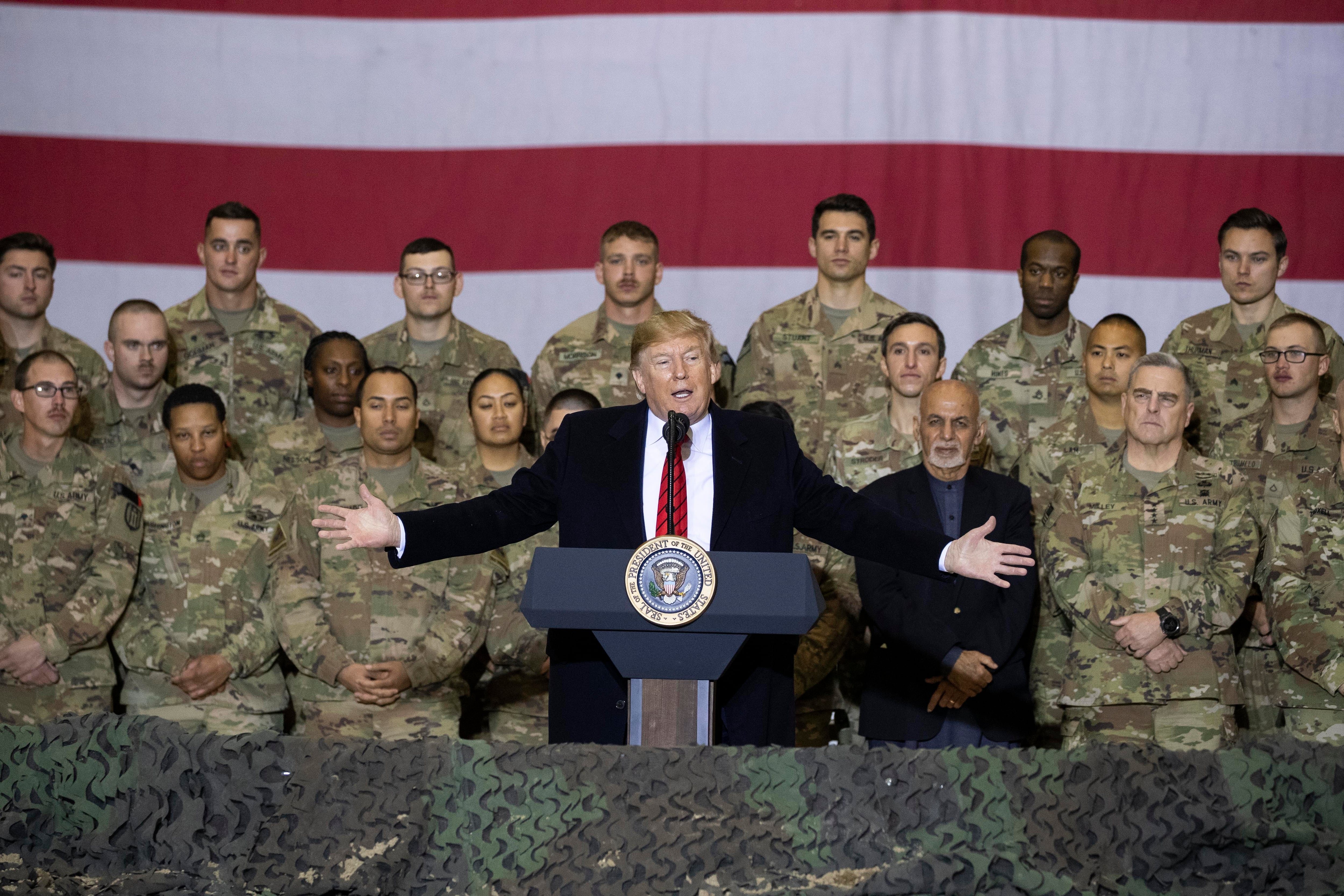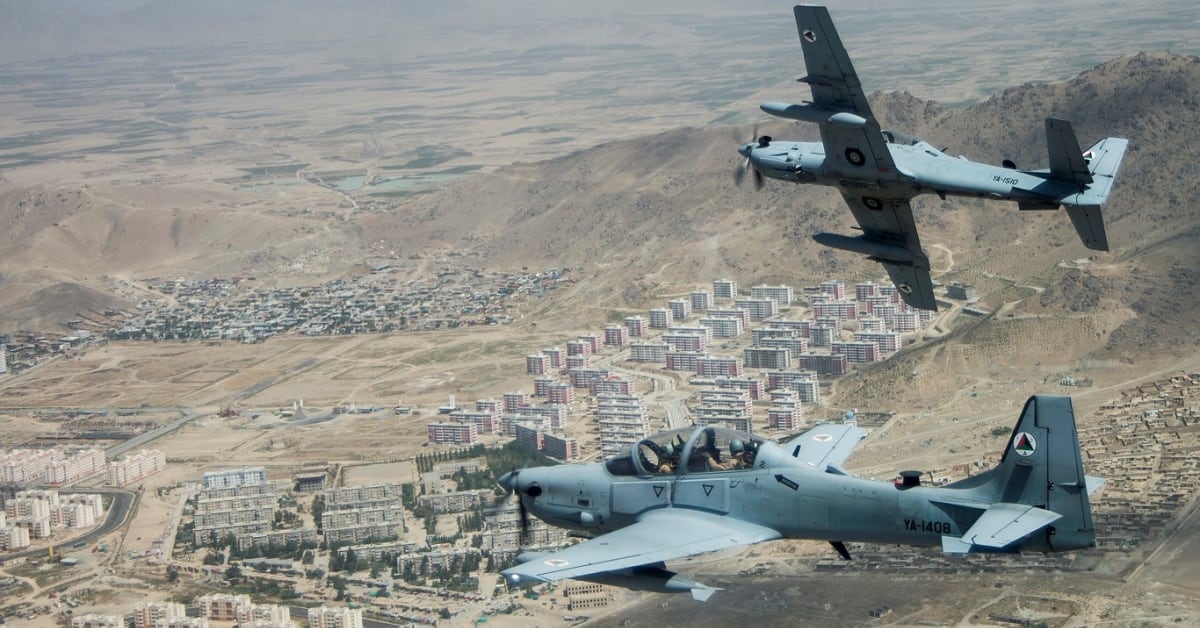The Afghan government said Saturday its forces cleared the opium rich and volatile district of Marjah, Afghanistan, after four years of control by the Taliban, but some remain skeptical of the claim and question whether Afghan forces can truly hold the territory.
The large-scale operation launched by Afghan forces around mid-November included U.S. special operations forces, ISR and air support by the conflict’s most iconic war bird the A-10 Thunderbolt II, according to two sources on the ground who spoke to Military Times on condition of anonymity because they were not authorized to speak on the record.
The Warthogs, assigned to the 303rd Expeditionary Fighter Squadron, are with the 451st Air Expeditionary Group out of Bagram Airfield.
Kern Hendricks, a photo journalist in Afghanistan, posted on Instagram a photograph of a U.S. Oshkosh M-ATV vehicle with a Texas flag operating in vicinity of the Marjah operation.
“Passing under the electronic eyes of a US Marine convoy, headed down to Marjah for a joint operation with the ANA [Afghan National Army],” the caption of the photo reads. “The American vehicles were bookended front and rear by ANA vehicles, to avoid taking the brunt of any IED’s they might encounter along the way.”
RELATED

Military officials with Resolute Support would not confirm particular U.S. air assets that supported the operation or whether Marines with a small advisory group in Helmand province, Afghanistan, known as Task Force Southwest, participated in clearing the Taliban stronghold.
“Resolute Support continues to operate in support of Afghan partners conducting operations against the Taliban, Daesh and others. This includes operations in Marjah, Helmand. Our operations and our support to Afghan security forces enable the conditions for political settlement and will ensure Afghanistan never again becomes a safe haven for terrorists," Resolute Support officials told Military Times in an emailed statement.
A U.S. source on the ground with direct knowledge of the operation told Military Times that American commandos and Afghan partner forces backed by U.S. air support had pushed into Marjah district.
The Afghan government touted the success of the operation in a press release Saturday boasting that Afghan forces cleared the district and killed 37 Taliban fighters including a Taliban commander known as Mullah Abdul Bari. The Afghan Ministry of Defense also detailed that Afghan forces defused more than 100 IEDs and destroyed six enemy command centers.
But the operation did come at significant cost to Afghan forces. The Associated Press reported that a roadside bomb Saturday killed Afghan Gen. Zahir Gul Muqbil, the army border unit commander.
The Taliban refuted claims that Marjah had been captured by Afghan forces. Taliban spokesman Zabihullah Mujahid tweeted Saturday that the operation to wrest control of Marjah had failed and that Afghan forces only had control of the district headquarters.
A U.S. source on the ground and a Marine veteran of the conflict are skeptical of the Afghan government’s claim that Marjah has been cleared of Taliban. The American source explained that ground assaults into Taliban strongholds are often slow because of roadside bombs. Taliban fighters often flee during these assaults only later to return and fight, he said.
RELATED

Afghan forces battling an onslaught of Taliban militants have routinely found themselves besieged and encircled in remote district headquarters unable to maneuver safely due to belted in roadside bombs and insurgents controlling rural farmlands and terrain. Most of Helmand is under Taliban control.
In 2017, when Sangin collapsed to the Taliban, U.S. officials explained that Afghan forces had merely moved to a new district headquarters due to extensive damage done to the old center.
“Marjah isn’t Taliban free, has never been Taliban free and will never be Taliban free,” the U.S. source explained.
Marjah is a hallowed battleground for the Corps that is steeped in lore akin to the bloody fight in Fallujah, Iraq. Nearly 50 American troops lost their lives fighting to clear Marjah of Taliban fighters.

Roughly 15,000 U.S. and Afghan troops launched a major operation from Feb. 2010 to Dec. 2010, dubbed Operation Moshtarak, to combat Taliban fighters in Marjah.
Marjah has been the scene of several Marine Silver Stars, a Navy Cross and the Corps’ second Medal of Honor to come out of the Afghan war — awarded to Kyle Carpenter for throwing himself on a grenade to protect a fellow Marine.
Scott Evans, a Marine veteran of the first wave of Operation Moshtarak, told Military Times that Marjah would simply fall back into Taliban hands because insurgents would likely buy off Afghan forces.
Evans was a Marine corporal and a dog handler supporting 3rd Battalion, 6th Marines, during the initial 2010 push into Marjah. He told Military Times that there was fighting there every day for the two months he was on the ground before he had to medevac his dog from the fight.
Evans said the fighting was difficult in and around the small collection of mud huts and compounds because insurgents were able to blend in and had freedom of movement.
The fight to clear Helmand and Marjah has received much criticism from national security experts who have argued that the heavy investment of U.S. forces in the sparsely populated rural farmland was a strategic mistake.
“My job was to make sure the guys behind me didn’t get blown up,” Evans said. “That was always worth it. I honestly never thought about tactical significance of the bigger picture of Marjah, it wouldn’t have changed anything.”
The U.S. is seeking to withdraw from Afghanistan through negotiations with the Taliban. President Donald Trump halted peace talks with the militant group in September. During a surprise Thanksgiving Day visit to Bagram air base, he told U.S. troops that negotiations with the Taliban were back on.
According to a Reuter’s story, Secretary of Defense Mark Esper said that a U.S. draw down of forces in Afghanistan was “not necessarily” linked to a peace deal with the Taliban.
There are currently about 13,000 U.S. troops in Afghanistan.
Shawn Snow is the senior reporter for Marine Corps Times and a Marine Corps veteran.





